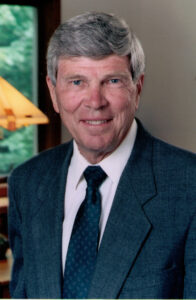Accessible History: A mission
JAMES MCPHERSON WF ’58
Share
 “A lot of Americans are, at best, historically semi-literate. Many of them, unfortunately, are historically illiterate.”
“A lot of Americans are, at best, historically semi-literate. Many of them, unfortunately, are historically illiterate.”
James McPherson WF ‘58, the George Henry Davis ’86 Professor of American History Emeritus at Princeton University, has made it his mission to bridge the gap between the academic and general audience studies of the American Civil War.
“I had always thought that that was a kind of duty of historians: if they had the ability to do it, to speak to an audience beyond the academy,” Dr. McPherson said in an interview with the Civil War Trust. “I’ve always believed in that purpose.”
Dr. McPherson is perhaps best known for Battle Cry of Freedom: The Civil War Era, his 1988 masterpiece that won the Pulitzer Prize and reignited interest in the Civil War for new generations of scholars. He is the author of numerous other books focusing on the American Civil War and Reconstruction, including The Struggle for Equality, which won the Anisfield-Wolf Award in 1965. Two of his books won Lincoln Prizes: For Cause and Comrades in 1998, and Tried by War: Abraham Lincoln as Commander in Chief in 2009 Lincoln Prize. In 2002, Dr. McPherson published Fields of Fury, a history of the Civil War for children.
Dr. McPherson’s interest in the study of history was sparked during his undergraduate days at Gustavus Adolphus College when, for the first time, he was intellectually challenged by a class called “American Civilization.” A Woodrow Wilson Fellowship took him to the Johns Hopkins University in 1958. Living in Baltimore, Dr. McPherson became active in the civil rights movement, and it was there his interest in the history of the Civil War was ignited.
“I was suddenly struck by the parallels between the events of my own time and the events exactly one hundred years earlier,” he said in an interview with the Wild River Review. “Confrontation between the federal government and southern political leaders vowing massive resistance; federal troops being sent into the south to enforce national law. The race issue, of course, was at the center of both periods.”
After studying under the noted C. Vann Woodward, Dr. McPherson earned his Ph.D. in 1963. Having begun teaching at Princeton University in 1962, he would lead students on yearly tours of battlefields. While walking the grounds, many would ask: “Why were men willing to cross this territory when they knew that many of them would not come back?”
This visceral reaction to place is an important element of the study of history for Dr. McPherson, who considers it crucial to conserve such places for both public access and academic study. In 1991, he was appointed to the Civil War Sites Advisory Commission by the U.S. Senate. He has also been President of the American Historical Association, of Protect Historic America, and of the Society of American Historians.
By preserving history, both in physical place and in written account, Dr. McPherson is continuing his mission to give the public an engaging and thorough view of history. This approach, he argues also allows for a better understanding of today’s events and where they might take us tomorrow.
“If you impose a map of, especially, the 2000 and 2004 elections, on a map of the Civil War, the red states were Confederate states or were not yet states, and the democratic states, the blue states, were the Union,” Dr. McPherson reflects in his conversation with the Civil War Trust. “The geographical division of the country is not so dissimilar from what it was a hundred and fifty years ago. The issues, if they’re not exactly the same, are certainly related in some ways. … So that’s another example of why it stays fresh and alive.”
Throughout his career, Dr. McPherson has remained committed to the practice of rigorous and accessible history.
“Look at the large membership in the history book club, the interest in the History Channel on television, and the interest in documentaries by Ken Burns and by other historical filmmakers,” he said to the NEH. “There is a real hunger out there which is not always reached by academic historians. I think they ought to reach out more than they do, and that is what I try to do.”
Stay Engaged
Get More News
Join our mailing list to get more news like this to your mailbox.
Support Our Work
Help us invest in the talent, ideas, and networks that will develop young people as effective, lifelong citizens.
Ways to Support Us